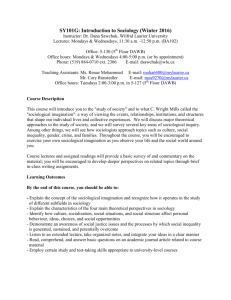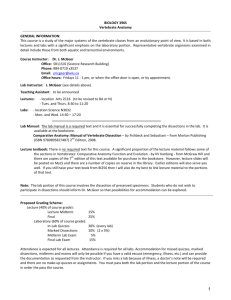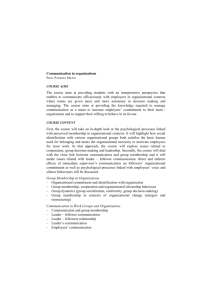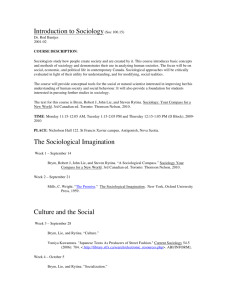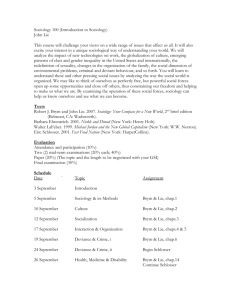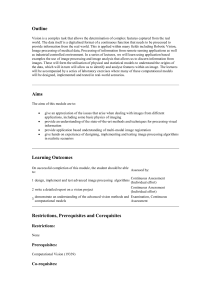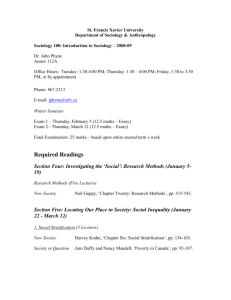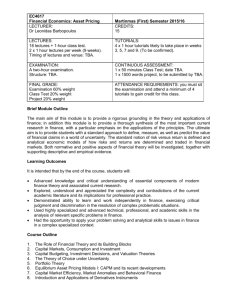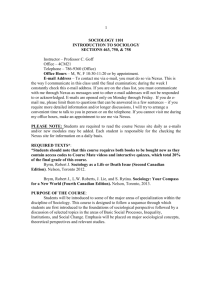SY101D: Introduction to Sociology (Winter 2004) - WLU
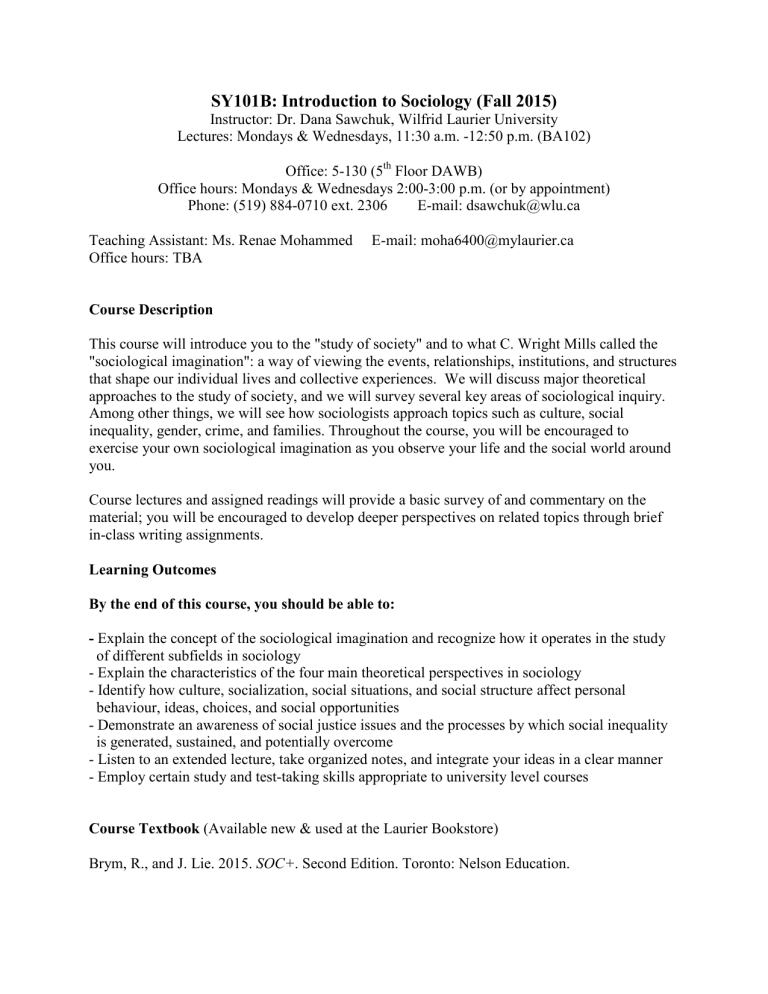
SY101B: Introduction to Sociology (Fall 2015)
Instructor: Dr. Dana Sawchuk, Wilfrid Laurier University
Lectures: Mondays & Wednesdays, 11:30 a.m. -12:50 p.m. (BA102)
Office: 5-130 (5 th
Floor DAWB)
Office hours: Mondays & Wednesdays 2:00-3:00 p.m. (or by appointment)
Phone: (519) 884-0710 ext. 2306 E-mail: dsawchuk@wlu.ca
Teaching Assistant: Ms. Renae Mohammed E-mail: moha6400@mylaurier.ca
Office hours: TBA
Course Description
This course will introduce you to the "study of society" and to what C. Wright Mills called the
"sociological imagination": a way of viewing the events, relationships, institutions, and structures that shape our individual lives and collective experiences. We will discuss major theoretical approaches to the study of society, and we will survey several key areas of sociological inquiry.
Among other things, we will see how sociologists approach topics such as culture, social inequality, gender, crime, and families. Throughout the course, you will be encouraged to exercise your own sociological imagination as you observe your life and the social world around you.
Course lectures and assigned readings will provide a basic survey of and commentary on the material; you will be encouraged to develop deeper perspectives on related topics through brief in-class writing assignments.
Learning Outcomes
By the end of this course, you should be able to:
- Explain the concept of the sociological imagination and recognize how it operates in the study
of different subfields in sociology
- Explain the characteristics of the four main theoretical perspectives in sociology
- Identify how culture, socialization, social situations, and social structure affect personal
behaviour, ideas, choices, and social opportunities
- Demonstrate an awareness of social justice issues and the processes by which social inequality
is generated, sustained, and potentially overcome
- Listen to an extended lecture, take organized notes, and integrate your ideas in a clear manner
- Employ certain study and test-taking skills appropriate to university level courses
Course Textbook (Available new & used at the Laurier Bookstore)
Brym, R., and J. Lie. 2015. SOC+ . Second Edition. Toronto: Nelson Education.
Internet
Students will be required to consult the MyLearningSpace site for this course
(https://mylearningspace.wlu.ca) for copies of course handouts, announcements, grades, etc.
More information on MyLearningSpace will be provided during the first week of class.
Students may also wish to consult the companion web site for the textbook at www.nelsonbrain.com. Note that the materials on the companion web site are provided free of charge with the purchase of your textbook (you will need to register the Access Code that comes on the card behind the front cover of the book) and are not considered to be required course material.
2
Course Requirements
1) In-Class Writing Exercises (details below)
Various dates throughout term
5x2% = 10%
2) Multiple Choice Study Skills Assignment
Held in class on October 5, 2015 (please bring your textbook!) 5%
3) Mid-Term Test 1
Multiple choice, covers all course material up to and including Oct. 19, 2015 25%
Written during class on October 21, 2015
4) Mid-Term Test 2
Multiple choice, covers all course material from Oct. 26 to Nov. 11, 2015 30%
Written during class on November 16, 2015
5) Final Exam
Multiple choice, material covered to be discussed in class
Date: TBA (during University final exam period: December 12-23, 2015)
30%
*Bonus Marks: Your TA and another SY101 TA will be holding study skills sessions in the first half of the term. There are two different sessions (Session A on “Time Management” and
Session B on “Readings, Lectures, and Note Taking”) and attendance is optional but highly encouraged. For each different session you attend, you will receive a bonus mark of 1.5% (for a potential total of 3% added to your final grade); you will also gain valuable skills that may help you increase your grades in this and your other classes at Laurier. Each of the two sessions will be held at different times during the week to accommodate a variety of schedules. Dates, times and additional details will be discussed in class and posted on MyLearningSpace.
3
In-Class Writing Exercises
- At the end of random classes, you will be given a question/writing exercise
- Use a pen and paper for these exercises (instructor will not provide these materials)
- Write one-half to a full-page (double-spaced) answer for each question
- Place your name and student number at the top of the page
- Hand in your answers at the end of the class
- Each assignment will be graded out of 2 marks
- Adequate answer = 2/2; Inadequate answer = 1/2; No answer = 0/2
- You will be given 6 chances to write these exercises and your top 5 will be counted for your
final grade.
- There are no make-up options for missed assignments: exercises cannot be handed in for classes
that you did not attend or for which you did not stay until the end of class.
Multiple Choice Study Skills Assignment
This will be an exercise that must be completed during class time on October 5 th.
If you miss this class session, no make-up assignment will be offered. If you have you extenuating medical or family circumstances for missing this class and can provide documentation, such as a doctor’s note in support of your claim, the value of this assignment (5%) will be added to the value of your final exam.
Missed Mid-Term
A make-up exam for a missed mid-term will be held at the instructor’s discretion. In order to be eligible to write the make-up exam, you must present appropriate documentation explaining your absence. Please note that you do not have the option of skipping the mid-term without a valid reason. If you miss the mid-term and do not provide the appropriate documentation, you will receive a score of zero for that exam.
Expectations: Attendance, Preparation, Mobile Devices, and Classroom Decorum
Regular attendance at all lectures is expected. Also, since lectures and readings will supplement each other, it is imperative that you complete the assigned readings on schedule (i.e., before class). If you do not keep up with the course material, you may find it difficult to follow class lectures or participate in class activities and your marks may suffer accordingly. You are also expected to behave responsibly and respectfully during class lectures. This includes turning off all cell phones during class (please see me if you have family or other responsibilities for which you need to keep your phone on) and restricting your use of laptop computers to note taking only.
Non course-related use of mobile devices (Facebook, texting, internet surfing, game-playing etc.) is prohibited and if you are caught using your device for such purposes you may be asked to put your device away for the remainder of the class or course. Finally, you should know that talking or even whispering during lectures can be very distracting to the instructor and to other students.
Please be aware that you may be asked to leave the lecture hall if you persist in talking or otherwise disrupting the lecture after you have been warned.
E-mail Policy
Please use your WLU account to send e-mail to my wlu.ca address (not MyLearningSpace).
Messages sent from non-WLU accounts may not be answered (and could end up caught in my spam filter). I will make every effort to respond to e-mail in a timely manner: within 24 hours on weekdays.
SY101B: LECTURE SCHEDULE, READINGS, AND IMPORTANT DATES
Week One
September 14 & 16: Introduction to the Course; What is Sociology?
Brym and Lie: Chapter 1
Week Two
September 21: Major Theoretical Perspectives
Brym and Lie.: Chapter 1 (review) and Chapter 4
****Drop-In Day: Come Meet the Prof (DAWB 5-130, 1:30-3:30 p.m.)****
September 23: Major Theoretical Perspectives (cont.)
Week Three
September 28 & 30: Culture
Brym and Lie: Chapter 2
Week Four
October 5: Study Skills Session (please bring your textbook to class)
Multiple Choice Study Skills Assignment (during class)
October 7: Socialization
Brym and Lie: Chapter 3
****October 12 & 14: No Class (Reading Week)****
Week Five
October 19: Socialization (cont.; review Chapter 3)
October 21: Term Test 1 (to be written during class time)
4
Week Six
October 26 & 28: Social Stratification
Brym and Lie: Chapter 6
Week Seven
November 2 & 4: Sexuality and Gender
Brym and Lie: Chapter 8
Week Eight
November 9 & 11: Race and Ethnicity
Brym and Lie: Chapter 7
****November 11: Last day to drop a 12-week course without academic penalty****
Week Nine
November 16:
November 18: Families
Term Test 2 (to be written during class time)
Brym and Lie: Chapter 9
Week Ten
November 23: Families (cont.)
November 25: Deviance and Crime
Brym and Lie: Chapter 5
Week Eleven
November 30: Deviance and Crime (cont.)
December 2: Technology, The Environment, and Social Movements
Brym and Lie: Chapter 13
Week Twelve
December 7: Technology, The Environment, and Social Movements (cont.)
December 9: Course Conclusion and Comments on Exam
Final Exam: Date TBA (during the University final examination period: Dec. 12-23, 2015)
“We acknowledge that we are on the traditional territory of the Neutral, Anishnawbe, and
Haudenosaunee peoples”
5
6
Fall/Winter 2015-2016 Additional Information
Student Awareness of the Accessible Learning Centre : Students with disabilities or special needs are advised to contact Laurier’s Accessible Learning Centre for information regarding its services and resources. Students are encouraged to review the Calendar for information regarding all services available on campus. Guidelines regarding the consideration of such students can be obtained by contacting the Accessible Learning Centre, ext. 3086, http://waterloo.mylaurier.ca/accessible/info/home.htm
Academic and Research Misconduct : Academic misconduct is an act by a student, or by students working on a team project, which may result in a false evaluation of the students(s), or which represents a deliberate attempt to unfairly gain an academic advantage. Academic misconduct includes: please refer to web site: http://www.wlu.ca/page.php?grp_id=2505&p=11452
Wilfrid Laurier University uses software that can check for plagiarism. Students may be required to submit their written work in electronic form and have it checked for plagiarism.
Examination Deferrals: The academic date section of the 2015/2016 calendar: http://legacy.wlu.ca/calendars/index.php?cal=1&y=65 (Deferred Examination Policy section) clearly states the examination policy and date period for each semester. Students must note that they are required to reserve this time in their personal calendars for the examinations . The examination period for this school year is: FALL TERM: December 12-23; Winter Term:
April 7 - 23.
Students who are considering registering to write MCAT, LSAT or GMAT or a similar examination, should select a time for those examinations that occurs outside the
University examination period.
For additional information regarding special circumstances for examination deferment, consult the Examination Policy web site and check the Deferred Examination Policy section: http://legacy.wlu.ca/calendars/section.php?cal=1&s=702&sp=2508&ss=2960&y=65#Deferred_E xamination_Policy (Special Examinations section) of the 2015/2016 University on-line calendar.
The up to date, official Academic Calendar is posted on Wilfrid Laurier University’s web site at http://legacy.wlu.ca
Go to Academic Info/Academic Calendars/Undergraduate
Academic Calendar/2015/2016
7
